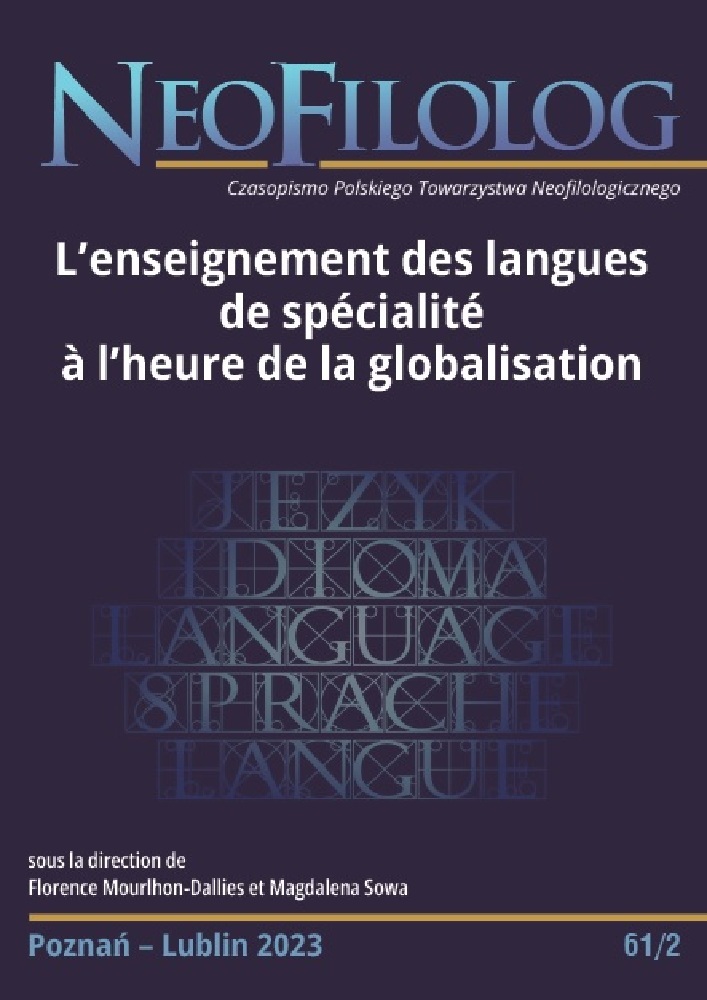Abstract
In the great upheavals of globalization, this article will focus on those who are not directly involved in this great movement. These include migrants. For them, the most useful language is that of survival, both social and professional. In this context, we will focus on the training demands that emanate from certain professional fields in France, formulated in the urgency of economic and human situations that concern the public employment actors, the training structures and of course the learners/workers themselves. Indeed, certain economic sectors are under pressure, in the sense that they are struggling to recruit. Recourse to migrant labour is therefore one of the solutions, but, in most cases, the question of mastering the language of the host country in oral and/or written form arises,. Didactic solutions must be found on a case-by-case basis, in a very precise and specific way. In order to describe and analyse this situation, the article will be based on two experiences of technical and linguistic training in two vocational training fields: i) catering and ii) building and public works.
Literaturhinweise
Adami H. (2020), Enseigner le français aux adultes migrants. Paris : Hachette.
Adami H. (2021), Les formations linguistiques à visée professionnelle pour les migrants en France : orientations sociales et didactiques. « Langues, cultures et sociétés », Vol. 7, n°1, 4–12. En ligne : https://revues.imist.ma/index.php/LCS/article/view/26417/13997 [consulté 16.06.2023].
Boutet J. (2001), La part langagière du travail : bilan et évolution. « Langage et société », n°98/4, 17–42. DOI: https://doi.org/10.3917/ls.098.0017
Garcia D., Le Bras H. (dir.) (2017), Archéologie des migrations. Paris : La Découverte. DOI: https://doi.org/10.3917/dec.garci.2017.01
Manné I., Rousseau L. (2022), Les métiers en forte tension dans le Grand Est : des recrutements plus souvent en contrat stable. « Insee Analyses Grand Est », n° 152.
Mangiante J.-M, Parpette C. (2004), Le français sur objectif spécifique : de l’analyse des besoins à l’élaboration d’un cours. Paris : Hachette.
Mangiante J.-M., Parpette C. (2022), Le FOS aujourd’hui : état de la recherche en Français sur Objectif Spécifique. Bruxelles : Peter Lang. DOI: https://doi.org/10.3726/b19432
Medina C. (2014), Le français parlé dans les Bâtiments et Travaux publics : de l’analyse interactionnelle à la constitution d’un parcours d’apprentissage. Presses Académiques Francophones.
Mourlhon-Dallies F. (2008), Enseigner une langue à des fins professionnelles. Paris : Didier. DOI: https://doi.org/10.14375/NP.9782278069989
Sanders L., Bretagnolle A., Brun P., Ozouf-Marignier M.V., Verdier N. (dir.) (2020), Le temps long du peuplement. Tours : Presses universitaires François-Rabelais.
Schwartz Y., Durrive L. (2003), Travail et ergologie. Entretiens sur l’activité humaine. Toulouse : Octarès Editions.
Lizenz

Dieses Werk steht unter der Lizenz Creative Commons Namensnennung - Keine Bearbeitungen 4.0 International.
Autoren:
Die Autoren der zur Veröffentlichung in der Zeitschrift Neofilolog angenommenen Texte sind verpflichtet, den Vertrag über die Erteilung einer kostenlosen Lizenz für die Werke mit der Verpflichtung zur Erteilung einer Sublizenz CC auszufüllen, zu unterzeichnen und an die Adresse der Redaktion zurückzusenden.
Gemäß Vertrag erteilen die Autoren auf die in der Zeitschrift Neofilolog veröffentlichten Texte der Adam-Mickiewicz-Universität in Poznań eine nicht exklusive und kostenlose Lizenz und erlauben die Verwendung der Sublizenz Creative Commons Attribution-NoDerivatives 4.0 International (CC BY-ND 4.0).
Die Autoren behalten das Recht zur weiteren freien Verfügung über das Werk.
Benutzer:
Interessierte Onlinebenutzer dürfen die seit 2017 veröffentlichten Werke unter folgenden Bedingungen nutzen:
- Anerkennung der Urheberschaft - die Verpflichtung, zusammen mit dem verbreiteten Werk Informationen über die Urheberschaft, den Titel, die Quelle (Links zum Originalwerk, DOI) und die Lizenz selbst bereitzustellen;
- ohne Schaffung abgeleiteter Werke - das Werk muss in seiner ursprünglichen Form erhalten bleiben, ohne Zustimmung des Autors dürfen keine Studien, beispielsweise Übersetzungen, verbreitet werden.
Die Urheberrechte aller veröffentlichen Texte sind vorbehalten.
Sonstige:
Die Adam-Mickiewicz-Universität in Poznań behält das Recht auf die Zeitschrift als Gesamtheit (Layout, Grafik, Titel, Umschlagsprojekt, Logo usw.).
